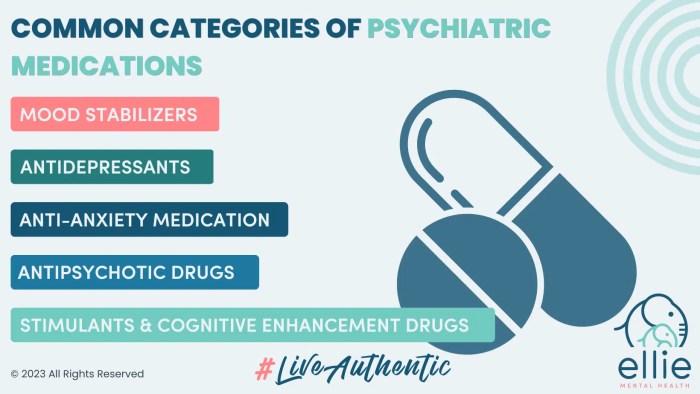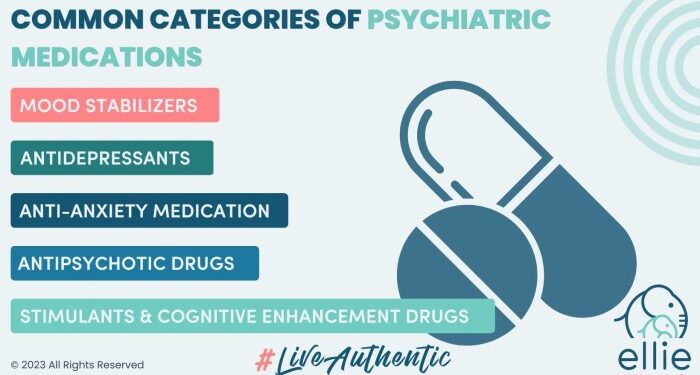Delving into the realm of Top Psychiatric Medications in 2025: Safety and Effectiveness, readers are invited to explore a landscape rich in insights and advancements. This passage sets the stage for a deep dive into the world of psychiatric medications, promising a journey that is both informative and thought-provoking.
Providing an in-depth look at the most prescribed psychiatric medications, safety comparisons, and effectiveness in treating mental health conditions, this discussion aims to shed light on the evolving landscape of psychiatric care.
Top Psychiatric Medications in 2025
In 2025, the most commonly prescribed psychiatric medications continue to play a crucial role in managing mental health conditions. These medications are constantly evolving to ensure both safety and effectiveness for patients.
Most Commonly Prescribed Psychiatric Medications
- Selective Serotonin Reuptake Inhibitors (SSRIs): SSRIs like Prozac and Zoloft are among the most prescribed medications for depression and anxiety disorders.
- Antipsychotics: Drugs such as Abilify and Risperdal are commonly used to treat schizophrenia and bipolar disorder.
- Stimulants: Medications like Adderall and Concerta are frequently prescribed for attention-deficit hyperactivity disorder (ADHD).
- Anxiolytics: Benzodiazepines such as Xanax and Ativan are often prescribed for anxiety disorders.
Safety Profiles of Top Psychiatric Medications
The safety profiles of these psychiatric medications have significantly improved over the years. Pharmaceutical companies are conducting rigorous clinical trials to ensure the safety and efficacy of these drugs. Newer medications are often designed to have fewer side effects and better tolerability compared to older generations of psychiatric drugs.
Effectiveness in Treating Mental Health Conditions
Research continues to demonstrate the effectiveness of these medications in managing various mental health conditions. From alleviating symptoms of depression and anxiety to stabilizing mood in bipolar disorder, psychiatric medications play a vital role in improving the quality of life for individuals struggling with mental health issues.
New Developments and Innovations

In 2025, the field of psychiatry has seen the introduction of several new medications that aim to revolutionize the treatment of mental health disorders. These innovative drugs are designed to enhance safety and effectiveness, offering new hope for patients struggling with various conditions.
Novel Psychiatric Medications
- A new class of antidepressants called NeuroReboot has been launched, targeting treatment-resistant depression. These medications work by modulating specific neurotransmitter pathways in the brain to provide relief for patients who do not respond to traditional antidepressants.
- Another breakthrough is the introduction of MindCalm, a novel anxiolytic that acts on the brain’s GABA receptors to induce a sense of calm without the sedative effects commonly associated with benzodiazepines.
- Furthermore, PsycheStim is a cutting-edge stimulant medication that offers improved focus and concentration for individuals with ADHD, utilizing a unique mechanism of action that minimizes side effects like insomnia and appetite suppression.
Mechanisms of Action
These innovative medications operate through sophisticated mechanisms of action that target specific pathways in the brain to achieve therapeutic effects. By honing in on precise neurotransmitter systems, these drugs can deliver more targeted and efficient treatment with fewer side effects.
Enhancing Safety and Effectiveness
- The new psychiatric medications in 2025 have undergone rigorous clinical trials to ensure their safety and efficacy profiles are superior to existing treatments. By leveraging advanced technologies and research methods, these drugs offer a more personalized approach to mental health care, minimizing the risk of adverse reactions.
- With a focus on optimizing therapeutic outcomes while reducing the burden of side effects, these innovative medications represent a significant advancement in the field of psychiatry, providing new options for patients who have not responded well to conventional treatments.
Patient Perspectives and Experiences
Patient testimonials provide valuable insights into the real-world impact of psychiatric medications. By sharing their experiences, patients can help healthcare providers and pharmaceutical companies understand the benefits and challenges of different medications. This feedback is crucial in improving existing treatments and developing new medications that better meet the needs of patients.
Influence on Medication Development
Patient feedback plays a significant role in shaping the development of new psychiatric medications. Pharmaceutical companies rely on patient experiences to identify areas for improvement, such as reducing side effects, enhancing efficacy, or optimizing dosing regimens. By listening to patients, researchers can tailor their efforts to address the specific concerns and preferences of those who rely on these medications for mental health support.
- Patients’ reports of side effects can lead to the refinement of drug formulations or the introduction of new medications with improved tolerability.
- Feedback on treatment outcomes guides researchers in identifying the most effective approaches to managing psychiatric conditions.
- Insights into the overall patient experience help healthcare providers offer personalized care and support to individuals undergoing psychiatric treatment.
Impact on Medication Adherence and Treatment Outcomes
Patient experiences have a direct impact on medication adherence and treatment outcomes. When patients feel heard and supported in their treatment journey, they are more likely to follow prescribed regimens and engage in therapy effectively. Conversely, negative experiences or unaddressed concerns can lead to non-adherence, treatment discontinuation, or poor clinical outcomes.
- Positive experiences with psychiatric medications can enhance patient trust in the treatment process and foster a sense of empowerment in managing their mental health.
- Open communication between patients and healthcare providers can lead to adjustments in treatment plans that better align with individual needs and preferences.
- Understanding patient perspectives allows for a holistic approach to mental health care, focusing on individual well-being and quality of life beyond symptom management.
Safety Measures and Regulations
In 2025, safety measures and regulations for psychiatric medications are paramount to ensure the well-being of patients and minimize potential risks associated with these medications.
Regulatory Oversight
Regulatory bodies such as the FDA (Food and Drug Administration) play a crucial role in evaluating the safety and efficacy of psychiatric medications before they are approved for use. These bodies meticulously review clinical trial data, assess potential side effects, and determine appropriate dosages to safeguard patient health.
- Regulatory agencies regularly conduct post-market surveillance to monitor the real-world effectiveness and safety of psychiatric medications.
- Stringent guidelines are in place to ensure that pharmaceutical companies adhere to strict quality control measures during the manufacturing process.
- Regulatory bodies collaborate with healthcare providers to educate them on the proper administration and monitoring of psychiatric medications.
Recent Changes and Enhancements
In recent years, there have been notable changes in guidelines to enhance patient safety and mitigate adverse effects associated with psychiatric medications.
- Increased emphasis on pharmacovigilance programs to detect and report adverse drug reactions promptly.
- Implementation of risk evaluation and mitigation strategies (REMS) to manage known or potential risks of certain psychiatric medications.
- Utilization of digital health technologies to improve medication adherence and monitor patient responses to treatment.
Closing Summary
Concluding our exploration of Top Psychiatric Medications in 2025: Safety and Effectiveness, we reflect on the strides made in medication safety, effectiveness, and patient experiences. This comprehensive overview serves as a testament to the progress in mental health treatment and the promising future that lies ahead.
Essential FAQs
What are the common side effects of the top psychiatric medications in 2025?
Common side effects may include drowsiness, nausea, and headaches, but it varies depending on the specific medication. It’s essential to consult with a healthcare provider for personalized information.
How do new psychiatric medications aim to improve safety compared to existing ones?
New psychiatric medications often undergo rigorous testing for safety and efficacy before approval. They may have better side effect profiles, improved mechanisms of action, or novel approaches to targeting mental health conditions.
How can patient feedback influence the development of new medications?
Patient feedback plays a crucial role in improving medication formulations, dosages, and delivery methods. It helps pharmaceutical companies and healthcare providers tailor treatments to better meet patient needs and preferences.



